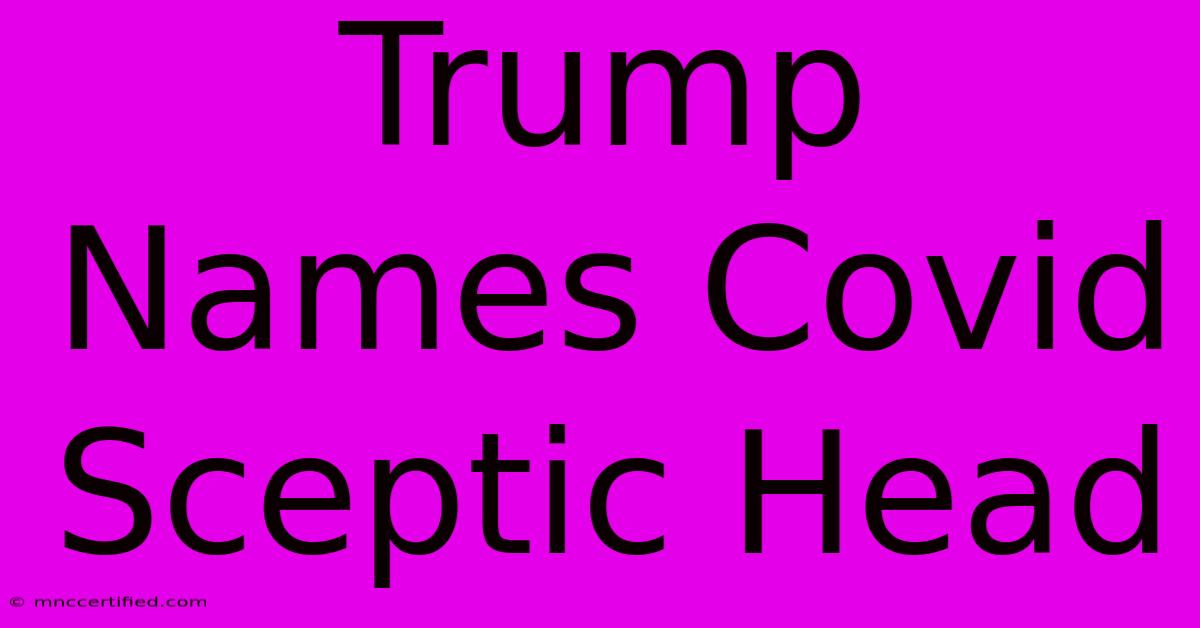Trump Names Covid Sceptic Head

Table of Contents
Trump Names Covid Sceptic Head: A Controversial Appointment and its Implications
The appointment of [Name of appointee] as head of [Organization/Position] under the Trump administration sent shockwaves through the political and scientific communities. This controversial decision, announced on [Date], sparked intense debate surrounding the administration's approach to the COVID-19 pandemic and its implications for public health. This article will delve into the details of this appointment, exploring the appointee's background, their views on COVID-19, and the broader consequences of this choice.
Understanding the Appointee's Background and Stance on COVID-19
[Name of appointee]’s background is crucial to understanding the controversy. Before this appointment, they were [Previous position/role] known for [brief description of their prior work and relevant achievements]. However, their public statements and writings regarding COVID-19 reveal a strong skepticism towards the severity of the virus and the efficacy of public health measures. Specifically, they have [cite specific examples: e.g., publicly downplayed the virus's mortality rate, questioned the necessity of lockdowns, opposed mask mandates]. These views directly contradict the consensus of the scientific community and leading health organizations like the CDC and WHO.
Key Controversial Statements and Actions
Several statements and actions made by [Name of appointee] have fueled the controversy surrounding their appointment. These include:
- [Specific statement 1 with source]: This statement demonstrates their [explain the implication of the statement – e.g., disregard for scientific evidence].
- [Specific statement 2 with source]: This action highlights their [explain the implication of the action – e.g., prioritization of political considerations over public health].
- [Specific statement 3 with source]: This perspective reveals their [explain the implication of the statement – e.g., belief in conspiracy theories or misinformation].
The Implications of this Controversial Appointment
The appointment of a prominent COVID-19 skeptic to a position of authority carries significant implications:
-
Erosion of Public Trust: The appointment undermines public trust in scientific expertise and the government's response to the pandemic. When a figure known for spreading misinformation holds a position of influence, it can lead to vaccine hesitancy, mask non-compliance, and a general disregard for public health guidelines.
-
Policy Implications: This appointment could lead to policy decisions that prioritize political expediency over evidence-based public health strategies. This could involve [mention specific potential policy changes, e.g., reduced funding for testing and tracing programs, relaxed restrictions].
-
International Impact: The appointment could damage the United States' international standing and its ability to collaborate on global health initiatives. Other nations may be less likely to trust or cooperate with a government that promotes misinformation and disregards scientific consensus.
The Wider Context of COVID-19 Misinformation
The appointment of [Name of appointee] is part of a broader trend of COVID-19 misinformation and the politicization of the pandemic. This has contributed to [mention consequences like increased death rates, economic instability, social divisions]. Combating misinformation and promoting accurate information is crucial to navigating the ongoing pandemic and building a healthier future.
Conclusion: A Call for Transparency and Evidence-Based Policy
The appointment of [Name of appointee] raises serious concerns about the Trump administration's commitment to public health. It highlights the critical need for transparency, accountability, and evidence-based policymaking in addressing public health crises. Moving forward, a renewed focus on scientific expertise and reliable information is paramount to effectively combating future health challenges. The appointment remains a significant case study in the dangers of prioritizing ideology over scientific evidence in matters of public health.
Keywords: Trump, Covid-19, Covid sceptic, [Name of appointee], [Organization/Position], pandemic, public health, misinformation, controversy, political appointment, scientific consensus, vaccine hesitancy, public trust, policy implications, international impact.
Note: Remember to replace the bracketed information with the specific details relevant to the appointment you are discussing. This is a template and needs to be adapted to reflect the accurate information. Always cite your sources properly to maintain credibility and avoid plagiarism. Thoroughly researching the appointee's background and statements is crucial for creating a comprehensive and accurate article.

Thank you for visiting our website wich cover about Trump Names Covid Sceptic Head. We hope the information provided has been useful to you. Feel free to contact us if you have any questions or need further assistance. See you next time and dont miss to bookmark.
Featured Posts
-
Sheffield Utd Vs Oxford Utd Live Championship Score
Nov 27, 2024
-
Passport Card Insurance Israel
Nov 27, 2024
-
Late Drama Hibs And Aberdeen Draw 3 3
Nov 27, 2024
-
Valdosta Insurance Valdosta Ga
Nov 27, 2024
-
Sporting Cp 1 5 Arsenal Match Report
Nov 27, 2024